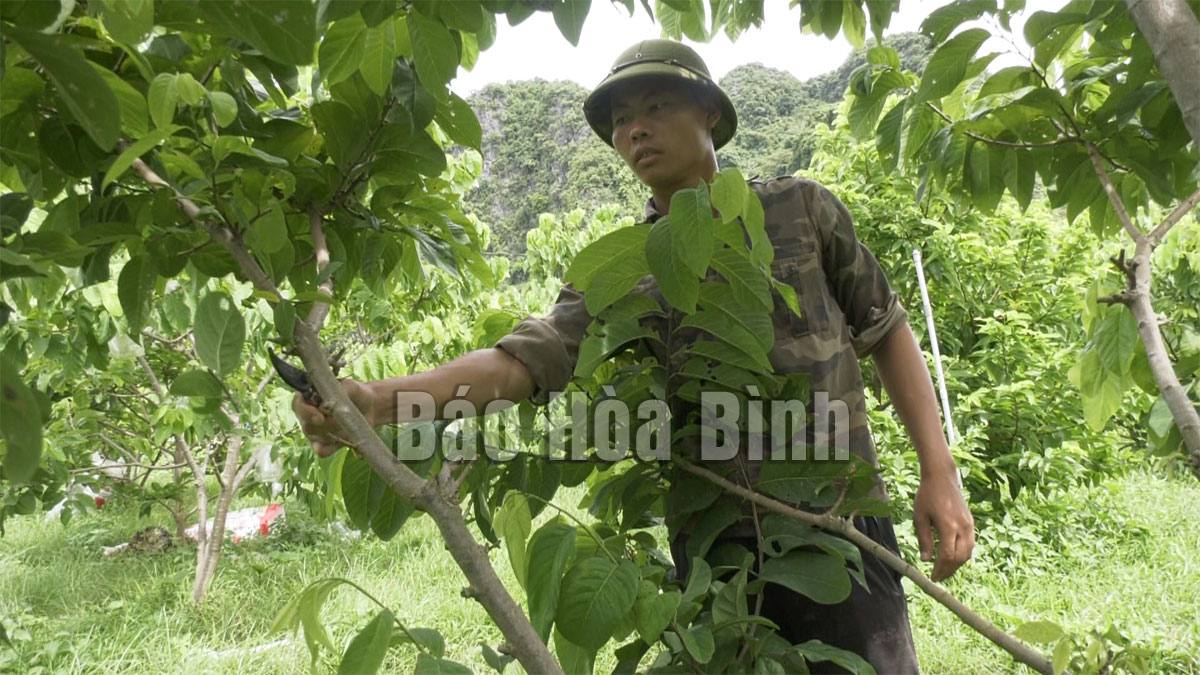
(HBO) - Bui Van Chung took a bold step in introducing the Thai custard apple to his poor farming commune in Yen Thuy district, and his effort has paid off.
The model of growing Thai custard
apple has produced high economic benefits to Bui Van Chung and his family in Da
Phuc commune, Yen Thuy district, Hoa Binh province.
In the search for a new farming model and increase income, in 2017, Chung
rented land in Bao Hieu commune for 50 years to start piloting the cultivation
of high economic value plants and animal husbandry. During the first year, he
planted asparagus and raised farm chickens, but the profit was not as he
expected. In 2018, he decided to switch to growing Thai custard apple on two
hectares of land. He invested in 500 trees and an automatic sprinkler
irrigation system to save labor and production costs. He himself learned
techniques of planting and caring for the fruit trees on the internet. In the
next two years, he planted an additional 1,500 Thai custard apple trees.
By now, after nearly four years of planting and learning, he has drawn a lot of
experience. Chung said that after 3 years, the trees began to give fruit. Each
tree yields about 10 kg of fruit, with the best quality fruit selling for
60,000 VND/kg. "This harvest I have earned 250 million VND in profit from the
fruit, excluding expenses,”he said.
According to Chung, compared to many
other kinds of fruit trees planted in the locality, Thai custard apple has
various advantages, one of which is higher profit. The tree can bear
fruit twice a year, so farmers can ensure stable income. Therefore, in the
coming time, he will continue to plant this fruit tree on the entire area of
the family's land.
Besides expanding the area of Thai custard apple trees, Chung also
invests in animal husbandry, earning a total annual income of about 300-400
million VND./.
The Standing Board of the Hoa Binh provincial Party Committee has agreed in principle on a proposal by the Standing Board of the Party Committee of Hoa Binh city to gather feedback on the city’s 1:2000 zoning plan, which forms part of its broader urban development strategy.
Hoa Binh province has made notable progress in public administration reform and digital government development, with the satisfaction index among citizens and businesses reaching over 84%, according to recent government evaluations.
Thanks to great efforts by local authorities in recent times, the governance and public administration performance of Mai Chau district has been significantly improved.
In the afternoon of June 6, the Party Committee, the People's Council, the People's Committee and the Fatherland Front of Lac Son district solemnly held a meeting to celebrate the 139th anniversary of the district's founding (1886–2025) and the 79th anniversary of the establishment of the district's Party Committee (1946–2025). There was the attendance of Mr. Bui Van Thang, the Vice Chairman of the Provincial People's Council; Mr. Quach Tat Liem, the Vice Chairman of the Provincial People's Committee; Ms. Dang Bich Ngoc, the Deputy Head of the National Assembly Delegation of the province; as well as the former leaders of the province and district through various periods, who are the natives of the district.
Implementing the Politburo’s Resolution No. 57-NQ/TW on breakthroughs in science – technology, innovation, and digital transformation is a golden opportunity for the northern mountainous province of Hoa Binh to renew growth model, improve competitive edge and shorten digital gap.
Resolution 57-NQ/TW, issued by the Politburo on December 22, 2024, identifies sci-tech, innovation, and digital transformation as strategic breakthroughs to build a developed and prosperous nation. In Hoa Binh province, this spirit is not just a slogan, it’s being put into action through concrete initiatives that form a "new development triangle”: digital citizenship, digital economy, and digital administration.



